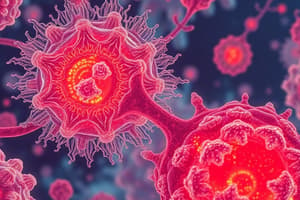Podcast
Questions and Answers
What are the cardinal signs of acute inflammation?
What are the cardinal signs of acute inflammation?
- Lymphadenopathy, malaise, and anorexia
- Fever, loss of function, and exudation
- Pain, vasodilatation, and increased blood flow
- Swelling, redness, and heat (correct)
What is the major problem associated with chronic inflammation?
What is the major problem associated with chronic inflammation?
- Development of autoimmune diseases
- Increased risk of infection
- Accelerated tissue repair and regeneration
- Contributes to almost every chronic Western disease (correct)
What are the steps of inflammation?
What are the steps of inflammation?
- Injury, pain, resolution
- Acute inflammation, immune response, chronic inflammation (correct)
- Vasodilatation, release of chemical mediators, tissue repair
- Innate immune response, specific immune response, adaptive immune response
What is the overall incidence of inflammatory diseases?
What is the overall incidence of inflammatory diseases?
Which receptor subtype is responsible for mediating mast cell chemotaxis?
Which receptor subtype is responsible for mediating mast cell chemotaxis?
Which generation of H1 antihistamines was withdrawn from the market due to cardiotoxicity?
Which generation of H1 antihistamines was withdrawn from the market due to cardiotoxicity?
Which receptor subtype is responsible for stimulating gastric acid secretion?
Which receptor subtype is responsible for stimulating gastric acid secretion?
Which H1 antihistamine is sedating?
Which H1 antihistamine is sedating?
Which generation of H1 antihistamines usually crosses the blood-brain barrier?
Which generation of H1 antihistamines usually crosses the blood-brain barrier?
Which receptor subtype controls the release of dopamine, GABA, ACh, 5-HT, and NE?
Which receptor subtype controls the release of dopamine, GABA, ACh, 5-HT, and NE?
Which receptor subtype is involved in feedback inhibition of histamine synthesis and release?
Which receptor subtype is involved in feedback inhibition of histamine synthesis and release?
Which H1 antihistamine does not cause sedation?
Which H1 antihistamine does not cause sedation?
Which generation of H1 antihistamines do not cause relevant side effects in the absence of drug interactions?
Which generation of H1 antihistamines do not cause relevant side effects in the absence of drug interactions?
Which receptor subtype is responsible for CNS depression and increased sedation?
Which receptor subtype is responsible for CNS depression and increased sedation?
Which H1 antihistamine is usually administered once or twice a day?
Which H1 antihistamine is usually administered once or twice a day?
Which receptor subtype is found in peripheral NS and controls the release of various neurotransmitters?
Which receptor subtype is found in peripheral NS and controls the release of various neurotransmitters?
Which of the following is true regarding acute inflammation?
Which of the following is true regarding acute inflammation?
Which cells are the first inflammatory cells attracted to the site of injury?
Which cells are the first inflammatory cells attracted to the site of injury?
What is a characteristic of chronic inflammation?
What is a characteristic of chronic inflammation?
Which of the following is a chemical mediator of inflammation?
Which of the following is a chemical mediator of inflammation?
What are neutrophils involved in?
What are neutrophils involved in?
What do basophils and mast cells secrete?
What do basophils and mast cells secrete?
What do macrophages secrete?
What do macrophages secrete?
What do T lymphocytes express?
What do T lymphocytes express?
What do B lymphocytes produce?
What do B lymphocytes produce?
Where is histamine preformed and stored?
Where is histamine preformed and stored?
What are the cellular mediators involved in chronic inflammation?
What are the cellular mediators involved in chronic inflammation?
Which cells are involved in phagocytosis and release of oxygen radicals?
Which cells are involved in phagocytosis and release of oxygen radicals?
Flashcards are hidden until you start studying
Study Notes
Inflammation: Acute vs Chronic and Cellular Mediators
- Acute inflammation involves alteration of vascular caliber, vasodilation, increased blood flow, and swelling
- Neutrophils are the first inflammatory cells attracted to the site of injury
- Acute inflammation resolves within hours to days
- Chronic inflammation is persistent, involving immune cells, mediators, cell/tissue damage, and repair
- Chronic inflammation leads to fibrous scarring and involves macrophages, lymphocytes, plasma cells, endothelial cells, and fibroblasts
- Chemical mediators of inflammation include vasoactive amines, cytokines, arachidonic acid derivatives, PAF, lysosomal enzymes, reactive oxygen species, and nitric oxide
- Neutrophils are short-lived cells involved in phagocytosis and release oxygen radicals, enzymes, and lysosomes
- Basophils and mast cells secrete histamine, leukotrienes, and prostaglandins, contributing to vasodilation, bronchoconstriction, and edema
- Macrophages are activated by antigens or cytokines and secrete factors promoting inflammatory responses, fever, and innate immunity
- T lymphocytes express T cell receptors and interact with antigen-presenting cells, playing a role in immune responses
- B lymphocytes produce different immunoglobulin classes and are activated by T helper cells
- Histamine is preformed and stored in mast cells and basophils and is responsible for vasodilation, bronchoconstriction, and edema
Studying That Suits You
Use AI to generate personalized quizzes and flashcards to suit your learning preferences.




